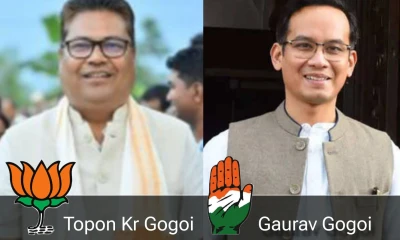Jorhat, nestled in the upper reaches of Assam’s Brahmaputra valley, stands as one of the pivotal Lok Sabha constituencies among the 14 in the State. As the 2024 Lok Sabha elections approach, Jorhat emerges as a significant contender, drawing attention for its demographics and historical voting patterns.
According to the 2011 India census, Jorhat is home to a population of 1,092,256 residents, nearly equivalent to the nation of Cyprus or the US State of Rhode Island. The demographic makeup comprises 54 per cent males and 46 per cent females, with a sex ratio of 961 per 1000 males. The district boasts a population density of 383 inhabitants per square kilometer, with 23.84 per cent residing in urban areas. Notably, the population growth rate witnessed a 9.21 per cent increase between 2001 and 2011.
Religiously, Hindus constitute the majority at 91.09 per cent, followed by Muslims at 5.85 per cent, and Christians at 2.25 per cent. The linguistic landscape reflects Assamese as the primary language, spoken by 88.65 per cent of the population, followed by Bengali, Hindi, and Mising.
Jorhat is renowned for its robust educational infrastructure, ranking next to Kamrup Metropolitan in literacy rates within the State.
Scheduled for phase 1 on April 19, the electoral dynamics of Jorhat witness a fierce competition primarily between the Bharatiya Janata Party or BJP and the Indian National Congress or INC. The constituency comprises 10 Assembly segments, setting the stage for a crucial battleground in the 2024 Lok Sabha elections.
Notably, the contest in Jorhat gains significance with former CM Tarun Gogoi’s son Gaurav Gogoi shifting to this constituency following the delimitation process that dissolved the Kaliabor seat.
The electoral battle features BJP candidate Topon Kumar Gogoi and Congress MP Gaurav Gogoi. In the backdrop of party campaigns electrifying the constituency, a notable event stirred discussions, as Topon Gogoi visited the residence of Dip Gogoi, uncle of Gaurav Gogoi.
In the 2019 Lok Sabha Elections, Topon Kumar Gogoi secured victory for the BJP with 51.35 per cent of the votes, while the INC’s Sushanta Borgohain emerged as the first runner-up with 43.54 per cent.
Historically, Jorhat’s political scenario has witnessed representation from numerous parties, including Bijoy Krishna Handique of the INC and Kamakhya Prasad Tasa of the BJP.
As Jorhat braces for yet another electoral showdown, the battle between Gogoi vs Gogoi promises a fiercely contested race for parliamentary representation, with the outcome shrouded in uncertainty.

















